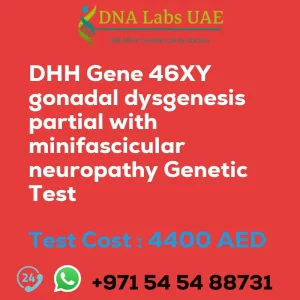LDB3 Gene Cardiomyopathy Hypertrophic Type 24 Genetic Test
Are you concerned about hypertrophic cardiomyopathy (HCM)? DNA Labs UAE offers the LDB3 Gene Cardiomyopathy Hypertrophic Type 24 Genetic Test to help diagnose this genetic disorder. With a price of 4400.0 AED, this test is a valuable tool for identifying mutations in the LDB3 gene associated with HCM.
Test Details
The LDB3 gene cardiomyopathy, hypertrophic, type 24 NGS genetic test utilizes next-generation sequencing (NGS) technology to detect mutations in the LDB3 gene. HCM is a condition that causes the heart muscle to thicken, making it more difficult for the heart to effectively pump blood. The LDB3 gene is responsible for producing a protein called LIM domain-binding protein 3, which plays a crucial role in maintaining the structure and function of heart muscle cells. Mutations in the LDB3 gene can disrupt the normal function of this protein, leading to the development of HCM.
The NGS genetic test for LDB3 gene cardiomyopathy, hypertrophic, type 24 involves sequencing the entire LDB3 gene to identify any mutations that may be present. This test is essential for individuals who exhibit symptoms of HCM and for family members of individuals with known mutations in the LDB3 gene. Early diagnosis is key in managing HCM and preventing complications such as heart failure and sudden cardiac death.
Test Components
- Price: 4400.0 AED
- Sample Condition: Blood or Extracted DNA or One drop Blood on FTA Card
- Report Delivery: 3 to 4 Weeks
- Method: NGS Technology
- Test Type: Neurological Disorders
- Doctor: Neurologist
- Test Department: Genetics
- Pre Test Information: Clinical History of Patient who is going for LDB3 Gene Cardiomyopathy, hypertrophic, type 24 NGS Genetic DNA Test. A Genetic Counselling session to draw a pedigree chart of family members affected with LDB3 Gene Cardiomyopathy, hypertrophic, type 24.
Diagnosis and Treatment
If you or a family member are experiencing symptoms of HCM, it is crucial to undergo the LDB3 Gene Cardiomyopathy Hypertrophic Type 24 Genetic Test. Early diagnosis allows for effective management of the condition and the prevention of complications. Treatment options may include medications, lifestyle changes, and in some cases, surgery or implantation of a defibrillator.
Don’t wait – take control of your health today. Contact DNA Labs UAE to schedule your LDB3 Gene Cardiomyopathy Hypertrophic Type 24 Genetic Test.
| Test Name | LDB3 Gene Cardiomyopathy hypertrophic type 24 Genetic Test |
|---|---|
| Components | |
| Price | 4400.0 AED |
| Sample Condition | Blood or Extracted DNA or One drop Blood on FTA Card o |
| Report Delivery | 3 to 4 Weeks |
| Method | NGS Technology |
| Test type | Neurological Disorders |
| Doctor | Neurologist |
| Test Department: | Genetics |
| Pre Test Information | Clinical History of Patient who is going for LDB3 Gene Cardiomyopathy, hypertrophic, type 24 NGS Genetic DNA Test A Genetic Counselling session to draw a pedigree chart of family members affected with LDB3 Gene Cardiomyopathy, hypertrophic, type 24 |
| Test Details |
LDB3 gene cardiomyopathy, hypertrophic, type 24 NGS genetic test is a diagnostic test that uses next-generation sequencing (NGS) technology to identify mutations in the LDB3 gene that are associated with hypertrophic cardiomyopathy (HCM). HCM is a genetic disorder that affects the heart muscle, causing it to thicken and making it harder for the heart to pump blood effectively. The LDB3 gene provides instructions for making a protein called LIM domain-binding protein 3, which is important for maintaining the structure and function of heart muscle cells. Mutations in the LDB3 gene can disrupt the normal function of this protein, leading to the development of HCM. The NGS genetic test for LDB3 gene cardiomyopathy, hypertrophic, type 24 involves sequencing the entire LDB3 gene to identify any mutations that may be present. This test can help diagnose HCM in individuals who have symptoms of the condition, as well as in family members of individuals with known mutations in the LDB3 gene. Early diagnosis of HCM is important for managing the condition and preventing complications such as heart failure and sudden cardiac death. Treatment options may include medications, lifestyle changes, and in some cases, surgery or implantation of a defibrillator. |








